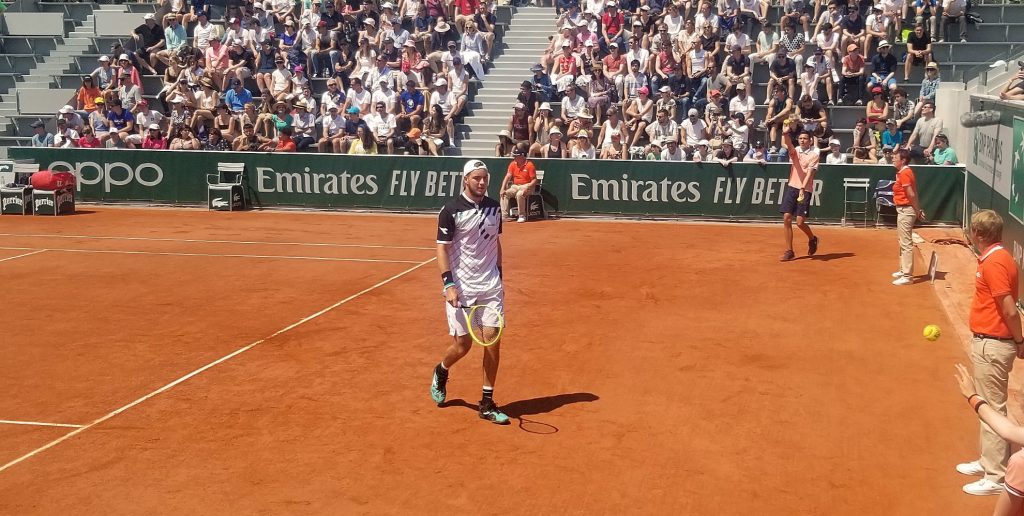Improbable it was, and that is no exaggeration. Jan-Lennard Struff of Germany, in four hours and 22 minutes, defeated the 13th-seeded Borna Coric 4-6 6-1 4-6 7-6 11-9 after an encounter that could (should) have been over in the Croatian’s favor at a number of occasions throughout the last two sets.
There are few reasons why Struff’s win was exceptional. For starters, for a large portion of the encounter was played on Coric’s terms. It consisted of both men relying on their serves to win points or to create a 1-2-punch opportunity. Both fared well in that department throughout the match, except that when they engaged in rallies, Coric regularly kept coming out on top. Struff was the one who needed to take extra risks (not that his regular game is not risky to begin with) and when he did, there were periods of time when he turned erratic.
More importantly, when the fifth and deciding set arrived, for 14 games – until 7-7 – Struff’s first serve that was crucial to his chances of winning left Court 14 to take stroll around Paris. He fell behind a break twice and still recovered – more on this coming up below.
It should also not be taken lightly that the German’s opponent was on his favorite surface and not playing a bad match by any means.
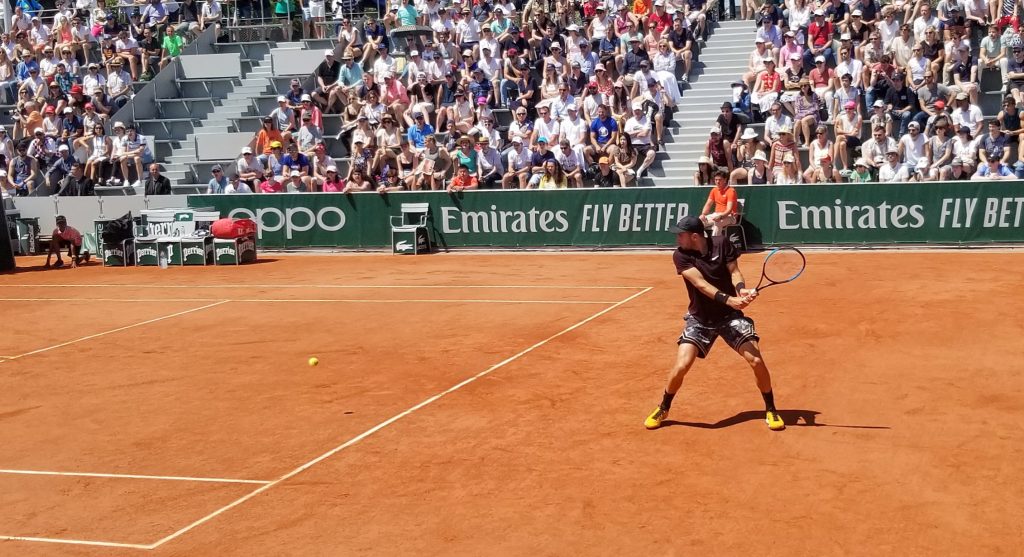
Let me go à priori through the first four sets which were something to behold on their own.
The first set is a good example of what I noted above, with both men using their first serves to create chances. They served a total of 5 aces combined but won a load of points on follow-up shots that put them in a winning position (or straight 1-2 punch winners). In fact, Coric’s first serves were so exceptional that he won 100% of his first-service points (which reminds everyone that you can perfectly dominate on your service without hitting a ton of aces, as long as you vary the pace, spin, and placement).
Coric also tried to step in on Struff’s second serves and pound returns (he positioned himself quite far back on Struff’s first serves, understandably – see photos below).
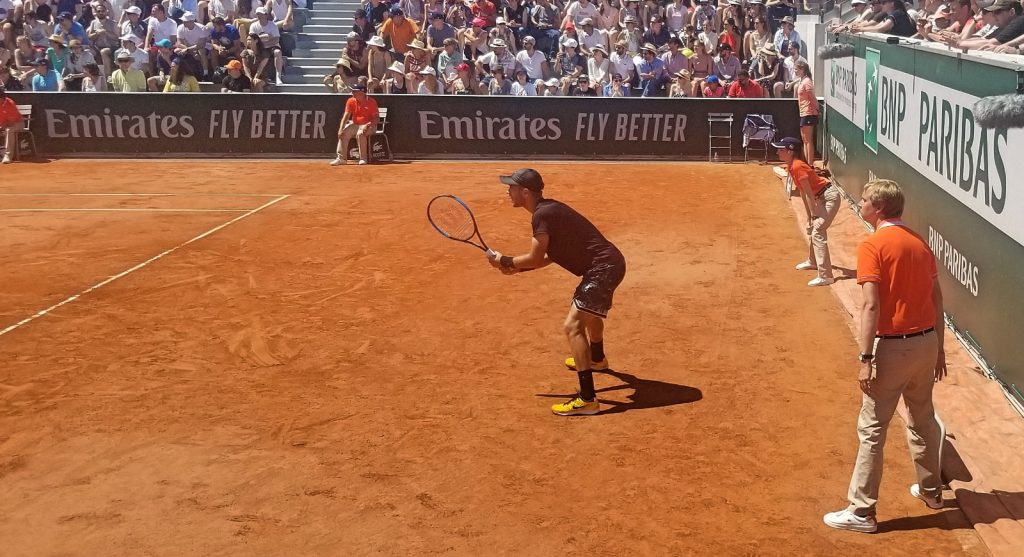
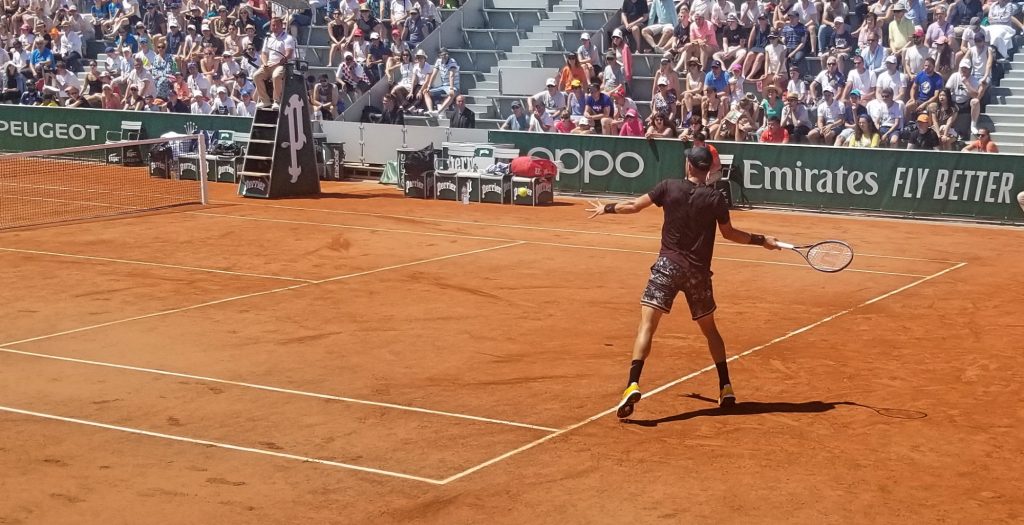
He made some of those aggressive returns, missed others. Struff, for his part, mixed in some serving-and-volleying or going to the net behind the 1-2 punch. Both players were putting their IQ’s to use, which was nice to see.
It was a clean, quality set of tennis, both playing clean tennis.
Coric did nonetheless seem to be one step closer to the finish line because whenever they engaged in rallies, he would come out on top. He also earned more opportunities to break his opponent’s serve (5 total break points) while Struff did not earn any.
Something needed to change, or the players were headed for a tiebreaker. The change happened at 4-4, on Struff’s serve. Coric got three excellent returns in early in the game and the score got to deuce. Few points later, on the third deuce, Coric was able to pin Struff to the baseline for another extended rally, ending with the German’s backhand unforced error. Coric capitalized on the break-point opportunity when he dipped his backhand low to the German’s feet at the net and forced him to miss. That is all Borna needed. He held serve, comfortably again, to confirm the break and take the first set 6-4.
Struff, knowing he now carries the burden of having to adjust, came out swinging in the second set. I mean, really swinging. Aiming for winners early in the rallies, nailing returns whenever he could, attacking the net behind approach shots struck to the corners, you name it, he tried it. And he did not miss! It may have been one of the best sets – or, the best – played by any player in the tournament so far. For all the risks that he took, Struff finished the set with one (yes, ONE) unforced error!**
**As usual, I do my own unforced-error count.
He also won 8 out of 10 points at the net and hit seven winners from groundies, averaging to one a game. He even won 10 out 16 points in rallies of 5 shots or more. If someone wonders what it means to “zone” in tennis, show them Struff’s second set in this match. It was a 32-minute-long blitz, and frankly, quite spectacular to watch.
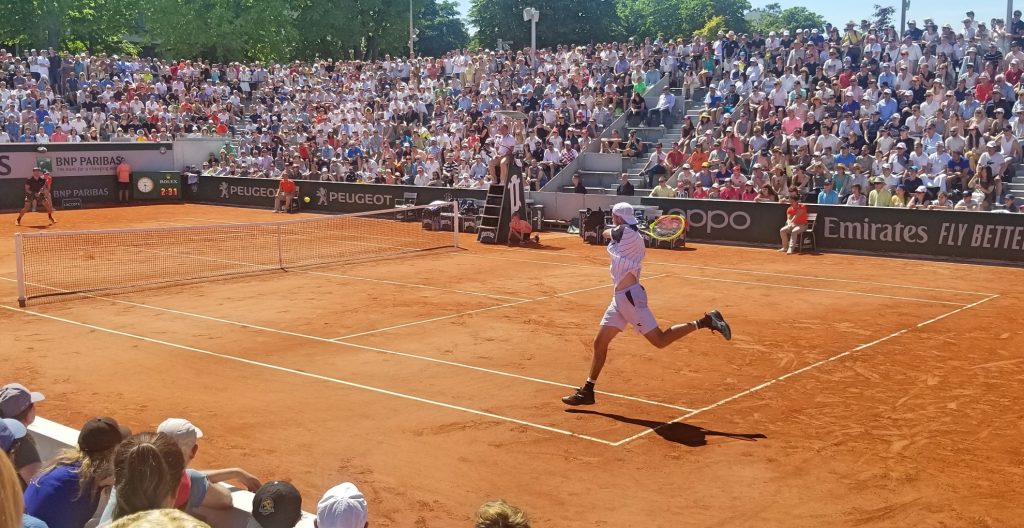
Coric, however, is not one to crumble. His mind is as anhcored as his game, and it takes a lot more than that to break his resolve. His ability to avoid drastic ups and downs in the mental department is one of the reasons for his steady rise through the ATP ranks (top 50 for two years, now top 20 for almost a year). He began by stopping the bleeding with an excellent game to start the third, hitting basically four service winners – including an ace. After Struff held his serve, Coric produced a second quality serving game, ending it with another ace.
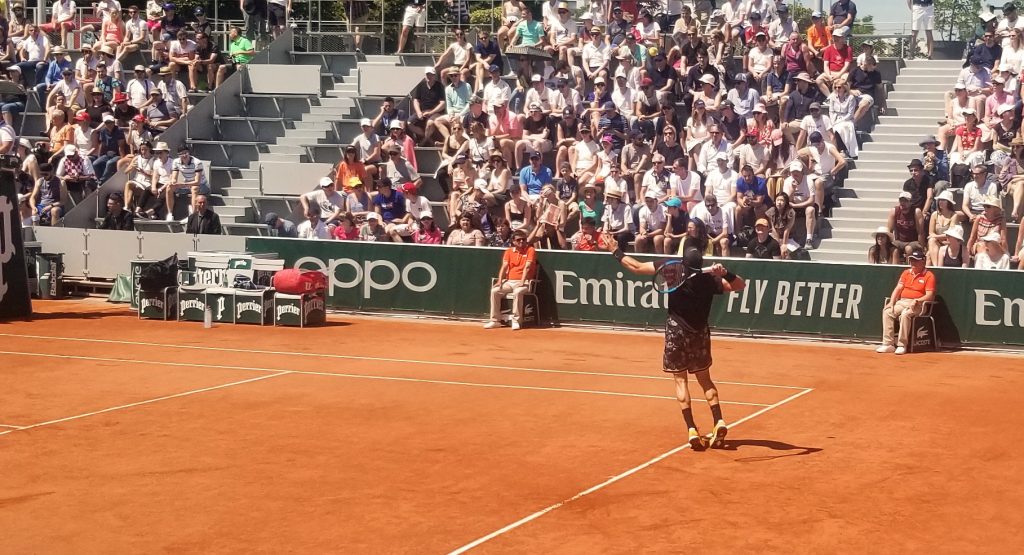
Just like that, the ship was steadied. Coric began to routinely win his serves again. Just like in the first set, he won 100% of points started with his first serve. Just like in the 4-4 game of the first set, Coric broke Struff’s serve at the end of the third set to close it out 6-4. In that 5-4 game, the only break of the set, Coric was once again able to engage Struff in a long rally that ended with the German’s error.
Struff did not respond to his third-set loss with the same surge as he did after losing the first set. In all fairness, how could he? His second-set output, nonpareil in every way, would be hard to match at any point in the near future. So, the fourth set unfolded very much in the same way as the first and third sets, with both men winning their serves, same patterns reemerging. Each man had to save one break point before we got to the late stages of the set.
Down 5-6, Struff had to hold to stay alive in the match and force a tiebreaker. He was within two points of losing the match on four occasions. In both of the last two of those, he had to resort to second serves. Coric, who has been going for his returns and having decent success at it until that moment, sailed the first return deep and nailed the second in the net (and yes, I count those as unforced errors, although official stats don’t just because it’s a return, but Coric was in no trouble at all, completely in position for both). Struff was fortunate to remain in the match after a game in which he committed a double fault and missed a routine forehand volley to the open court at deuce.
The tiebreaker was a blur, in a bad way for Coric, probably the worst 8-point stretch of the match for him until then. He made a couple of unforced errors, Struff hit an ace and winner, and he found himself down 0-6 in a flash. Two points later, he lost the set on a double fault.
Having played under pressure for most of the match, against an opponent was the better player overall for almost three hours (except the second set), and having survived second-serve points in order to avoid going down a match point twice, Struff must have felt fortunate to be at 2 sets a piece.
Did I mention that the sun was shining brightly, and that the temperature was rising? Probably the hottest day of the tournament so far.
Fifth set began much in the same way as the previous sets have – except the second, of course. Then came the 2-2 game…
Coric nailed four incredible returns in 6 points, one a clean winner, two that Struff could not get back, and one that he barely got back but that Coric drummed away on the next one. But man, oh man, how Coric would have loved to trade one of those returns for the two that he missed at 6-5, deuce, in the fourth set!
As if to mock Borna, at 30-30 in the next game, Struff nailed a return winner of his own to get to 30-40 and struck another one so hard and deep that Coric could not get back.
Breaks exchanged. Order restored!
Until the 6-6 game, that is…
Coric broke Struff’s serve again (more coming below about the German’s serving in the fifth) and had an opportunity to serve out the match at 7-6. But, he did not get a single first serve in and got blanked to lose the break advantage.
Speaking of not making first serves, here comes the most notable head-scratching stat of the day. Until 7-7, Struff made only 30% of his first serves. That is 14 out of 46 in numbers, folks. He fell behind a break twice during that period, and yet, he still found a way to survive.
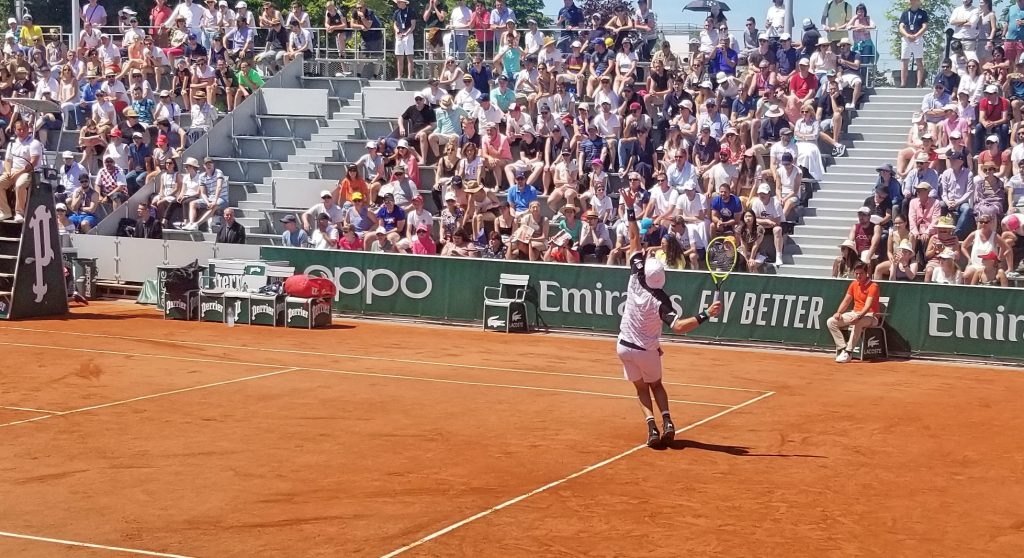
In the 5-5 game, for example, he lived solely on second serves and still held. Let me reiterate that Struff’s game plan and success largely depend on him getting the most out of his first serves. In other words, he survived under crippling circumstances from his perspective, for the large majority of the deciding set. He was clutch though! When he was down a break point twice in the 4-4 game, he knew to get in two big first serves (part of that 30% through the first 14 games of the fifth set) to save them. He knew how to pull the two big returns, as noted above, at 3-2 down, 30-30 on Coric’s serve.
Last but not the least, he did finally manage to turn his dismal first-serve outing until 7-7 into a banner one in his last three serving games, getting 16 out 22 first serves in. That is 73%, up a whopping 43% from the first 7 serving games of the final set. At 9-9, he served 5 out of 6 first serves in, three of them aces!
Coric, on the other side of the net, looked weary, mentally and physically. Down 9-10, he began the game with a forehand unforced error. He made only one first serves out of eight attempts in that game and double-faulted twice, the second one giving Struff a match point. The German sealed it with a winner, and the numerous Germans on Court 14 began the celebration chants while he collapsed on his knees, in a state of euphoria.
I used “improbable” in the title, only because this is the type of match whose details, for the most part, tell you one thing, yet the scoreboard says the opposite.
Did the winner outplay the loser? Not really. Did the loser choke? Not really, certainly not in the way that caused the match to take a 180-degree turn. Did the winner make an amazing turn-around? Not really, there were several dispersed occurrences, mostly in the fourth and fifth sets, that determined the final score.
Did one player get lucky, or the other unlucky? No.
Was the winner fortunate? Yes!
Did the winner deserve to win? Certainly!
And there lies the difference between “lucky” and “fortunate.”
